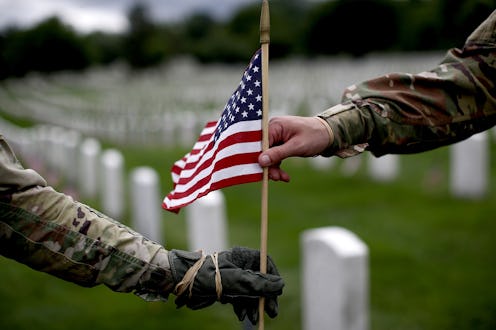News
The Reason General Pershing Is Famous Isn't What Trump Thinks It Is

In a tweet published Thursday, President Donald Trump urged his followers to study how Gen. John J. Pershing allegedly eradicated terrorism in the early 1900s. However, Trump's claim that Pershing shot terrorists with bullets dipped in pigs blood during the Philippine-American war has been largely debunked. So, what is Gen. Pershing actually famous for?
While Pershing had a lengthy military career, he is perhaps most famous for commanding the American Expeditionary Force during World War I. A year after the war ended, Congress approved then-President Woodrow Wilson to recognize Pershing for his service by promoting him to "General of the Armies." Pershing is one of only two people (the other having been George Washington) to have ever been promoted to this prestigious rank.
Born near Laclede, Missouri, in 1860, Pershing did not always have military ambitions. According to Biography.com, Pershing worked as a teacher for more than two years before he decided to sit for the exam required for entry to West Point. With his graduation from West Point in 1886, Pershing began his nearly four-decade long military career.
Prior to his service in World War I, Pershing fought in the Spanish-American War and in the Philippine-American War along with leading the Mexican Expedition to capture Pancho Villa during the Mexican Revolution.
As America entered World War I in 1917, Pershing was named commander in chief of the American Expeditionary Force (AEF) and although the AEF was initially expected to merely bolster depleted European troops, Pershing argued they would be more effective as an independent army. On Sept. 12, 1918, Pershing led the AEF in its first major offensive as an independent army on European soil in the Battle of Saint-Mihiel. He would go on to lead the AEF into other battles, including the Battle of Cantigny and the Meuse-Argonne offensive, which hastened the end of the war.
Following the end of World War I, Pershing served as U.S. Army Chief of Staff from 1921 to 1924 before retiring from active service at the age of 64. In his later years, Pershing published an autobiography entitled My Experiences in the World War, which earned him a Pulitzer Prize in 1932.
On July 15, 1948, at the age of 87, Pershing died in his sleep while reportedly recovering from a stroke. He is buried at Arlington National Cemetery and continues to be one of American history's most honored and revered soldiers.